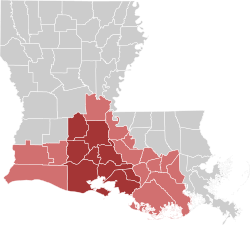My friend Quentin is from Lafayette, LA. Lafayette was founded by a French-speaking Acadian named Jean Mouton (aka Jean Sheep)--therefore, Lafayette developed as the Cajun center of Louisiana. We've talked about the Cajuns before, and a lot of Cajun phrases are completely new to me, so I enjoy hearing about them.
Q insists people will say "to my house" instead of "at my house"--presumably coming as a direct translation of "c'est a ma maison" where the preposition "a" can be translated as "to" or "at."
Considering Cajuns say all kinds of crazy things like "making groceries" (to shop for groceries, a calque of the Cajun French faire des groceries) and "my eye!" or "my foot!" to mean "no way!"--in French, it's pretty common to say "mon oeil!" or "mon pied!" to express disbelief-- so this doesn't surprise me.
I had just never heard it before.
Also, here is a map of where Cajun English is spoken.

I'll also go ahead and mention that Q makes it a point to refer to his people as Creole, not Cajun. I mean, that's understandable, because they actually are Creole, not Cajun--but to people who aren't either, there aren't really any real connotations either way. But Quentin talks about how Cajun carries so many negative implications that Creole doesn't... which is funny to me.
Creole
is derived from the Latin word "crear", which meant, "create." In 1590, Father J. de Acosta decided that the mixed breeds born in the New World were neither Spanish, African, Indian, but various mixtures of all three, thus a created race. So he identified them as "Criollos".
Creoles also have their own brand of French. Over time, the black Créoles and Africans created a French and West African hybrid language called Créole French or Louisiana Creole French. It was used in some circumstances by slaves, planters and free people of color alike. It is still spoken today in central Louisiana.
People who are neither Cajun nor Creole often have trouble identifying the differences between the two. Culturally, they started off very differently, but as Spanish and then French Catholics took over the region, the cultural blending progressed.
Creoles were the first European settlers in New Orleans and the Mississippi river plantations. The considered themselves of aristocratic decent. Their heritage was of France, Spanish or Portuguese origins. Creoles were considered to be very wealthy. Some were given high political appointments by the crown. Creole holdings involved shipping, banking and plantation ownership. Their businesses faltered after the Civil War without slave labor.
Acadians (Cajuns) originating from the West coast of France (Brittny/Normandy) first settled Nova Scotia in 1604. Most were of peasant descent with little or no education, who worked with their hands. After being loaded on ships by the British, who expelled they from Nova Scotia, they began arriving in Louisiana about 1765. Cajuns mostly settled the bayous and open prairies where they could continue their trades of trapping, fishing and farming.
It seems--by Quentin's attitude anyway--that a little bit of snobbery still lingers. How curious!
No comments:
Post a Comment